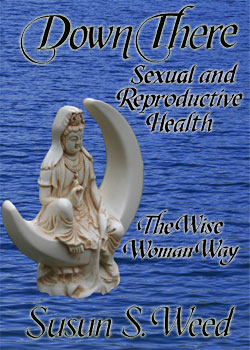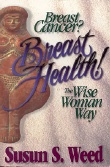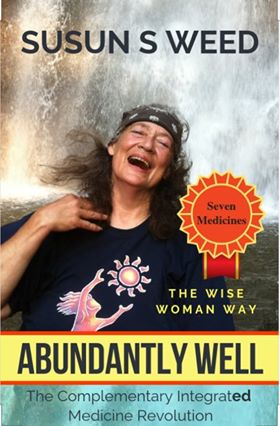PAP SMEAR
© Susun S. Weed
George Papanicolaou, a pathologist, pioneered this non-invasive screening test in the 1920s. It is not diagnostic. False negative results will occur 10-20 percent of the time.
 A Pap smear is a sample of the tissues of the cervix (and sometimes vagina). In order to collect this sample, women are asked to lay back and put their feet up in stirrups. If this position makes you uncomfortable in any way, tell the examiner you want to put your feet on the examining table. With your knees spread, a speculum is gently fitted into your vagina and opened, making the cervix visible. Breathing deeply and relaxing will make any strange sensations easier to bear.
A Pap smear is a sample of the tissues of the cervix (and sometimes vagina). In order to collect this sample, women are asked to lay back and put their feet up in stirrups. If this position makes you uncomfortable in any way, tell the examiner you want to put your feet on the examining table. With your knees spread, a speculum is gently fitted into your vagina and opened, making the cervix visible. Breathing deeply and relaxing will make any strange sensations easier to bear.
A small implement and a tiny brush are used to collect cells from the outside of the cervix and from inside the cervical os, like using your fingernail to scrape cells from the inside of your cheek, it is not painful, and there is rarely any bleeding.
The collected cells are either preserved in liquid (best) or smeared directly on a slide. Liquid preservation is required for HPV-DNA testing. Pathologists "read" Pap smears with a microscope, looking for cellular changes, such as cells with large black nuclei (cancer).
The vagina is best kept in its natural state for at least 24 hours prior to the Pap smear: avoid douching, intercourse, spermicides, vaginal hygiene products and sprays, and the insertion of boluses, pessaries, or hormonal creams. For the best results, keep it totally natural for three days before your Pap. Cancel your Pap smear if you are menstruating or have had vigorous sex the night before, as it won’t be accurate.
The original classification of Pap smear results - into four broad categories - created confusion on the part of patients and doctors, and resulted in hundreds of thousands of women being frightened into harsh treatments.
Since 1988, a clearer system, the Bethesda, has been used. It was hoped that expanding the categories and giving more specific information about the cells in the smear would limit the amount of over-treatment. Unfortunately, the new classifications have doubled the number of women with abnormal results, so, instead of fewer needless hysterectomies and drug prescriptions, twice as many women are told they need treatment.
"Unfortunately, informed consent rarely enters the Pap test equation. … The need to be fully informed about the risks as well as benefits is even stronger for anyone undergoing a screening test, which by definition is given to healthy people without symptoms."
There are at least 30 different variations in the spectrum from healthy to cancerous cervical cells. The Bethesda system shows these:
• Negative for lesions
• Organisms present
• ASC-US (Atypical squamous cells of undetermined significance)
• ASC-H (As above, but may include HSIL)
• LSI L(Low-grade squamous epithelial lesion)
• HSIL (High-grade squamous epithelial lesion; dysplasia; cervical carcinoma in situ)
• AGC: Atypical glandular cells
• CIN II, CIN III (cervical intraepithelial neoplasia)
• AIS: Endocervical adenocarcinoma in situ
• Squamous cell carcinoma
• Adenocarcinoma
There is controversy about what level of abnormality requires further tests or treatment, and how often women need to have a Pap smear done.
PAP ABNORMALITIES - WHAT TO DO?
• Conservative guidelines send women with ASC-US for a colposcopy. Liberal practitioners rely on DNA testing along with repeat Pap smears to follow women who are HPV-DNA free (99.5 percent of women negative for HPV-DNA are cancer free ). At CIN II/ III they schedule a colposcopy. Only half of women with CIN III will progress to cervical cancer in five years.
• If you have a "bad" Pap report, redo the smear in 3-6 months before you agree to any treatment or even any further diagnosis.
"For every person who benefits from early detection, many more are diagnosed with a cancer they did not need to know about."
PAP SMEAR - HOW OFTEN?
• A visit to the gynecologist for a first Pap smear is a worthwhile part of any young woman’s puberty (menarche) ceremony. Remember, it is not necessary to have sex to be infected with HPV.
• The American Cancer Society says all women under the age of 65 should have a yearly Pap smear. This includes women without a uterus (in one-third of hysterectomies done in the USA the cervix is left) and even those without a cervix (as smears from the vagina can reveal vaginal cancer).
• In countries with socialized health care, Pap smears are done every third year since cervical cancer grows so slowly.
• However, Pap test results are notoriously inaccurate, with a false negative rate of 10-60 percent. Yearly testing is thought to make up for this deficiency.
• Computerized screening (PAPNET) promised to correct false results from human-read Pap smears, but has actually increased ambiguous findings and over-treatment.
• The safest course for sexually active women who are under the age of 25, sexually active women of any age who have multiple partners, and any woman whose sole partner has other partners, is to have a yearly Pap smear. However, given that women who have annual Pap smears are the most likely to be over-treated, that may not be the healthiest thing to do! Protect yourself by refusing invasive tests or treatment until two or even three more Pap tests, taken at least three months apart, show abnormalities.
"Based on solid evidence, regular screening with the Pap test leads to additional diagnostic procedures (e.g. colposcopy) and [surgical] treatment for low-grade squamous intraepithelial lesions (LSIL), with uncertain long-term consequences on fertility and pregnancy. These harms are greatest for younger women, who have a higher prevalence of LSIL, lesions that often regress without treatment.
"Additional diagnostic procedures were performed in 50% of women undergoing regular Pap testing. Approximately 5% were treated for LSIL. The number with impaired fertility and pregnancy complications is unknown." National Cancer Institute website, 2006
 For those, like myself, who prefer to avoid doctor visits, a visual exame is as good, and may be better. Nurse-midwives in Zimbabwe were asked to take a Pap smear, then to swab the cervix with a mild vinegar solution and (with the aid of a flashlight) to check for white areas that signal abnormal cells. While 77 percent of the positive vinegar tests were accurate, only 44 percent of the positive Pap smears were correct.
For those, like myself, who prefer to avoid doctor visits, a visual exame is as good, and may be better. Nurse-midwives in Zimbabwe were asked to take a Pap smear, then to swab the cervix with a mild vinegar solution and (with the aid of a flashlight) to check for white areas that signal abnormal cells. While 77 percent of the positive vinegar tests were accurate, only 44 percent of the positive Pap smears were correct.
To check yourself, you’ll need only a speculum, a mirror, a flashlight, white vinegar, and cotton swabs.
A study of 2,763 postmenopausal women who had Pap smears annually for four years found 110 women with abnormal results, but only one woman who actually had cervical cancer.
"Even in the context of a major clinical trial, which would presumably employ the most skilled pathologists, these specialists disagreed with one another’s diagnosis [of Pap smears] at an alarmingly high rate."
________________________________________
Susun Weed
PO Box 64
Woodstock, NY 12498
To learn more sign up for Susun Weeds Course Your Healthy Vagina & Cervix
Visit Susun Weed at: www.susunweed.com and www.wisewomanbookshop.com
For permission to reprint this article, www.ashtreepublishing.com/contact
Vibrant, passionate, and involved, Susun Weed has garnered an international reputation for her groundbreaking lectures, teachings, and writings on health and nutrition. She challenges conventional medical approaches with humor, insight, and her vast encyclopedic knowledge of herbal medicine. Unabashedly pro-woman, her animated and enthusiastic lectures are engaging and often profoundly provocative.
Susun is one of America's best-known authorities on herbal medicine and natural approaches to women's health. Her four best-selling books are recommended by expert herbalists and well-known physicians and are used and cherished by millions of women around the world. Learn more at www.susunweed.com
Down There: Sexual and Reproductive Health the Wise Woman Way

Publication date: June 21, 2011
Author: Susun S. Weed
Simple, successful, strategies cover the entire range of options -- from mainstream to radical -- to help you choose the best, and the safest, ways to optimize sexual and reproductive health.
Foreword: Aviva Romm, MD, midwife, 484 pages, Index, illustrations
Order at:
www.wisewomanbookshop.com

Susun Weed’s books: |

|
Wise Woman Herbal for the Childbearing Year
Author: Susun S. Weed.
Simple, safe remedies for pregnancy, childbirth, lactation, and newborns. Includes herbs for fertility and birth control. Foreword by Jeannine Parvati Baker. 196 pages, index, illustrations.
Order at: www.wisewomanbookshop.com
|

|
Healing Wise
Author: Susun S. Weed.
Superb herbal in the feminine-intuitive mode. Complete instructions for using common plants for food, beauty, medicine, and longevity. Introduction by Jean Houston. 312 pages, index, illustrations.
Order at: www.wisewomanbookshop.com |

|
NEW Menopausal Years the Wise Woman Way
Author: Susun S. Weed.
The best book on menopause is now better. Completely revised with 100 new pages. All the remedies women know and trust plus hundreds of new ones. New sections on thyroid health, fibromyalgia, hairy problems, male menopause, and herbs for women taking hormones. Recommended by Susan Love MD and Christiane Northrup MD. Introduction by Juliette de Bairacli Levy. 304 pages, index, illustrations.
Order at: www.wisewomanbookshop.com
For excerpts visit: www.menopause-metamorphosis.com
|

|
Breast Cancer? Breast Health!
Author: Susun S. Weed.
Foods, exercises, and attitudes to keep your breasts healthy. Supportive complimentary medicines to ease side-effects of surgery, radiation, chemotherapy, or tamoxifen. Foreword by Christiane Northrup, M.D. 380 pages, index, illustrations.
Order at: www.wisewomanbookshop.com
|

|
Down There: Sexual and Reproductive Health the Wise Woman Way
Publication date: June 21, 2011
Author: Susun S. Weed
Simple, successful, strategies cover the entire range of options -- from mainstream to radical -- to help you choose the best, and the safest, ways to optimize sexual and reproductive health.
Foreword: Aviva Romm, MD, midwife, 484 pages, Index, illustrations.
Order at: www.wisewomanbookshop.com
|

|
Abundantly Well - Seven Medicines
The Complementary Integrated Medical
Revolution
Publication date: December 2019
Author: Susun S. Weed
Seven Medicines build foundational health and guide you to the best health care when problems arise.
Includes case studies, recipes, exentsive references and resources. Introduction by Patch Adams illustrated by Durga Yael Bernhard 352 pages, index, illustrations
Order at: www.wisewomanbookshop.com
|











 Baby
Magic
Baby
Magic

